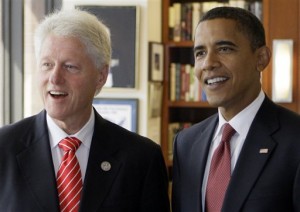 For the most part, Bill Clinton’s reconstruction of the Democratic Party is a masterpiece that did not survive the consummate political artist’s time in power: balanced budgets seem like a relic of a bygone era; the pro-growth, business friendly wing of the Democratic Party has given way to Elizabeth Warren style populism; and modulated stances on social issues have been replaced with legal fights against Catholic hospitals, rhetorical battle cries about a “War on Women”, and a place in the party’s platform for a fifty state right of same sex marriage.
For the most part, Bill Clinton’s reconstruction of the Democratic Party is a masterpiece that did not survive the consummate political artist’s time in power: balanced budgets seem like a relic of a bygone era; the pro-growth, business friendly wing of the Democratic Party has given way to Elizabeth Warren style populism; and modulated stances on social issues have been replaced with legal fights against Catholic hospitals, rhetorical battle cries about a “War on Women”, and a place in the party’s platform for a fifty state right of same sex marriage.
The exception, the one preserved centrist jewel from that era, had been (until last week) the 1996 reform of welfare. As a policy instrument, the conversion of welfare from an entitlement to an earned benefit conditioned on work, job training, or secondary level education like a GDE program rested on decades of data about the perils of dependency in poor communities. As a political instrument, coupling public assistance with a work requirement achieved a stunning result: a benefit program that had been deeply controversial, and racially polarizing, was re-crafted as a bipartisan amalgam of left-leaning altruism and right-leaning notions of personal responsibility.
 As a result, one of the most contentious ideological disputes between seventies and eighties era conservatives and liberals all but disappeared as a flashpoint. It has been Social Security and Medicare–not welfare–that movement conservatives have sought to redesign in the past eight years, and the most provocative expenditure of public dollars in the last four years has been the transfer of nearly a trillion dollars to the banking and automobile industries rather than any form of public assistance.
As a result, one of the most contentious ideological disputes between seventies and eighties era conservatives and liberals all but disappeared as a flashpoint. It has been Social Security and Medicare–not welfare–that movement conservatives have sought to redesign in the past eight years, and the most provocative expenditure of public dollars in the last four years has been the transfer of nearly a trillion dollars to the banking and automobile industries rather than any form of public assistance.
Given that run of success, and the fairly indisputable social theory behind it, the Obama Administration’s about-face on welfare policy last week is one of its more curious leftward movements. It’s a policy thrust that didn’t surface in the context of the stimulus in 2009 and its entirely defensible expansion of unemployment benefits, and gutting the work requirement has not been a subject of agitation even in liberal circles despite abysmal levels of African American and Latino youth unemployment. Then there is the inconvenience of the Obama camp having to explain away his enthusiastic defense of the 96 law in the last campaign, when the Illinois Senator volunteered his belated support of the work requirement as the single area of public policy where his views had shifted most dramatically.
A shift that makes so little substantive sense–and carries obvious election year risks–begs explanation. One suspicion is that the move is campaign bait to lure Republicans into a round of welfare-bashing that could galvanize elements of the Democratic base. (presumably, those parts of the base who remain unmoved by fear-mongering around voter ID laws and a steady drumbeat on black radio about the racial backlash that is alleged to be at the core of GOP efforts this fall).
The broader prism, however, may be that Obama presidency is simply doubling down on its inclinations about the limited usefulness of bipartisanship. An administration that declined to bolster healthcare reform by cutting a deal with moderate Senate Republicans on tort reform or health saving accounts, and that refused to break its 2011 jobs bill into individual components that might attract Republican votes, may be similarly unmoved by the value of a welfare program that has substantial Republican buy-in.
It may also be that Obama is not “evolving”, but reverting back to the kind of liberal combativeness that was essential for an aspiring state senator trying to rise in left leaning Chicago, and that characterized Obama’s 2008 jabs at the Clinton presidency’s lack of “transformative” firepower.
Either reality underscores that for all of its political imaginativeness, the Obama camp is engaged in an entirely different kind of enterprise than those “non-transformative” Clintonites. Rather than co-opt Republicans by snatching selected policy goals of theirs, rather than shoring up broader public support by giving Republicans partial ownership of his agenda, Obama’s energies appear focused on reviving liberalism as a coherent, unapologetic governing philosophy. It’s the sentiment of a liberalism that views conservatism not as a genuine rival, but as a discredited, weakening force that may not survive the country’s shifting demographics.
The troublesome part for Obama is that the long-term is no substitute for the short-term fact that his campaign has done precious little to salvage its standing with the white blue-collars and socially conservative independents that swung sharply to the right in 2010. And if the bloc-of-the month maneuvers of this year pay off with a nose-length victory, the middle-term looks unappealing too: a government that has tuned out roughly half the country, more stratification in American politics, and a return to a scorched earth debate over what we owe the poor and what they owe themselves.
(Cross-posted, with permission of the author, from OfficialArturDavis.com)









Leave a Reply